Why you can trust Tom's Hardware
Ryzen 7 5800X Power Consumption, Thermals
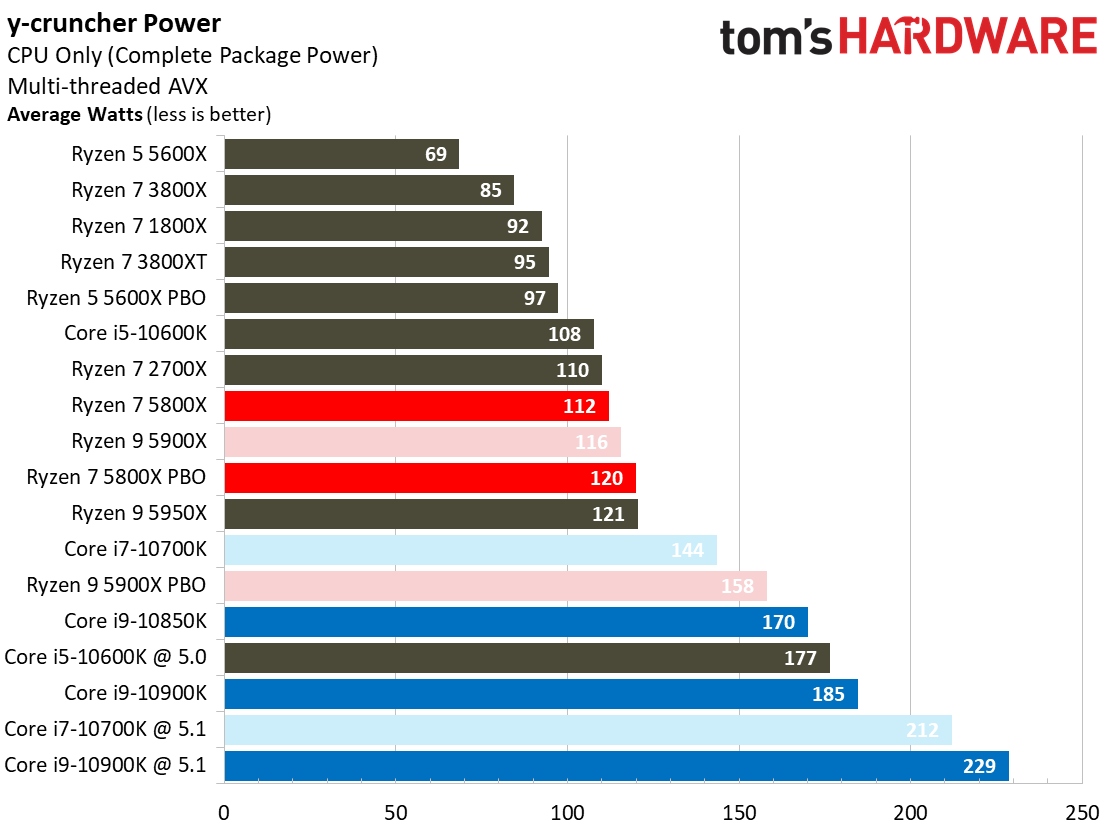
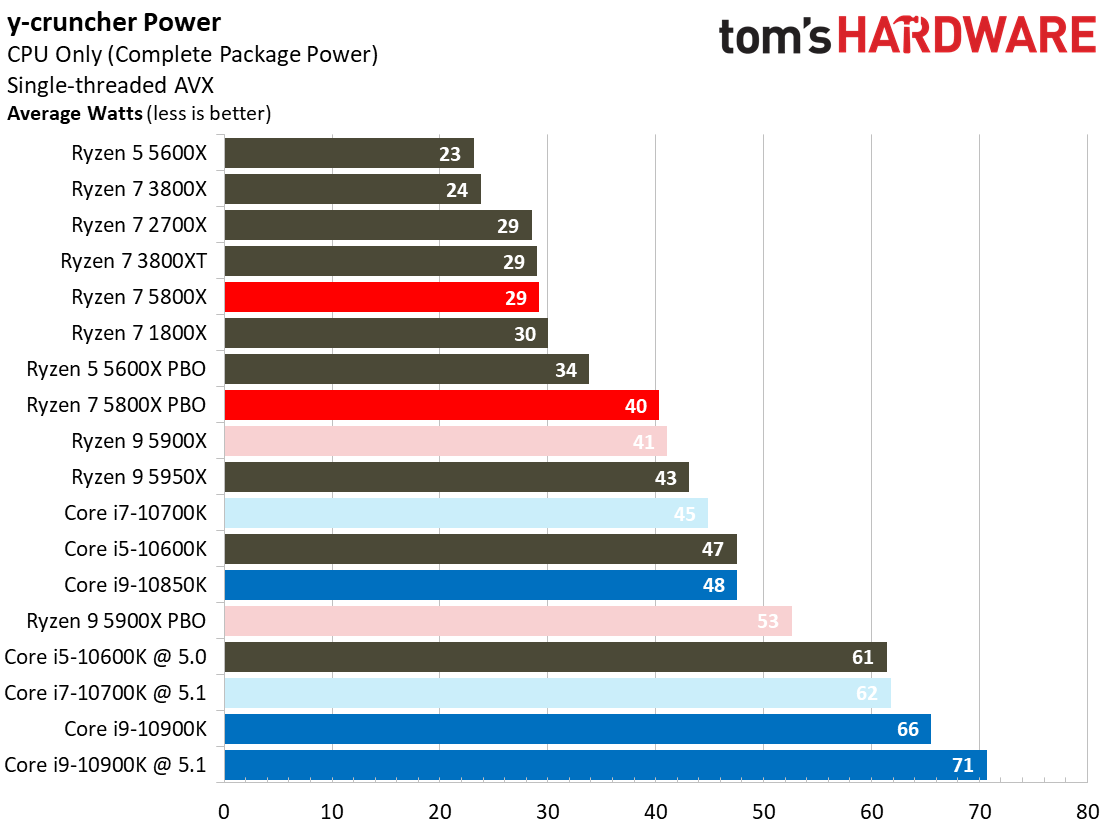
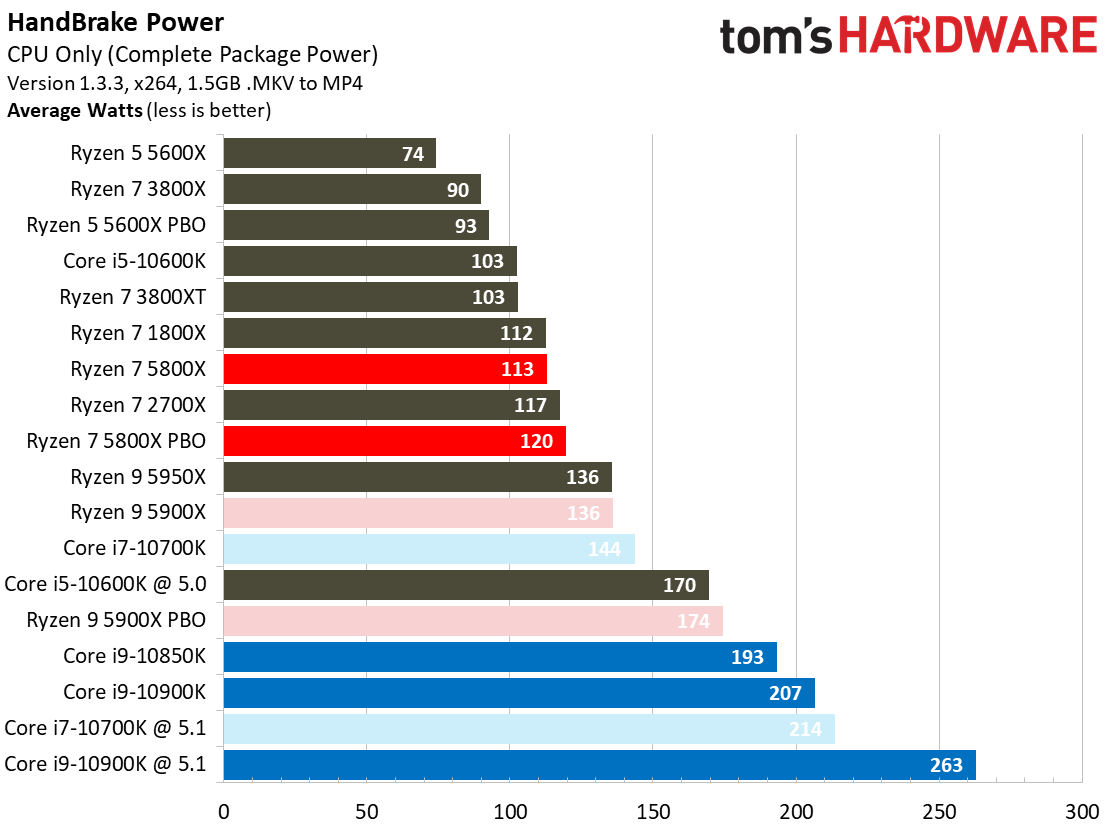
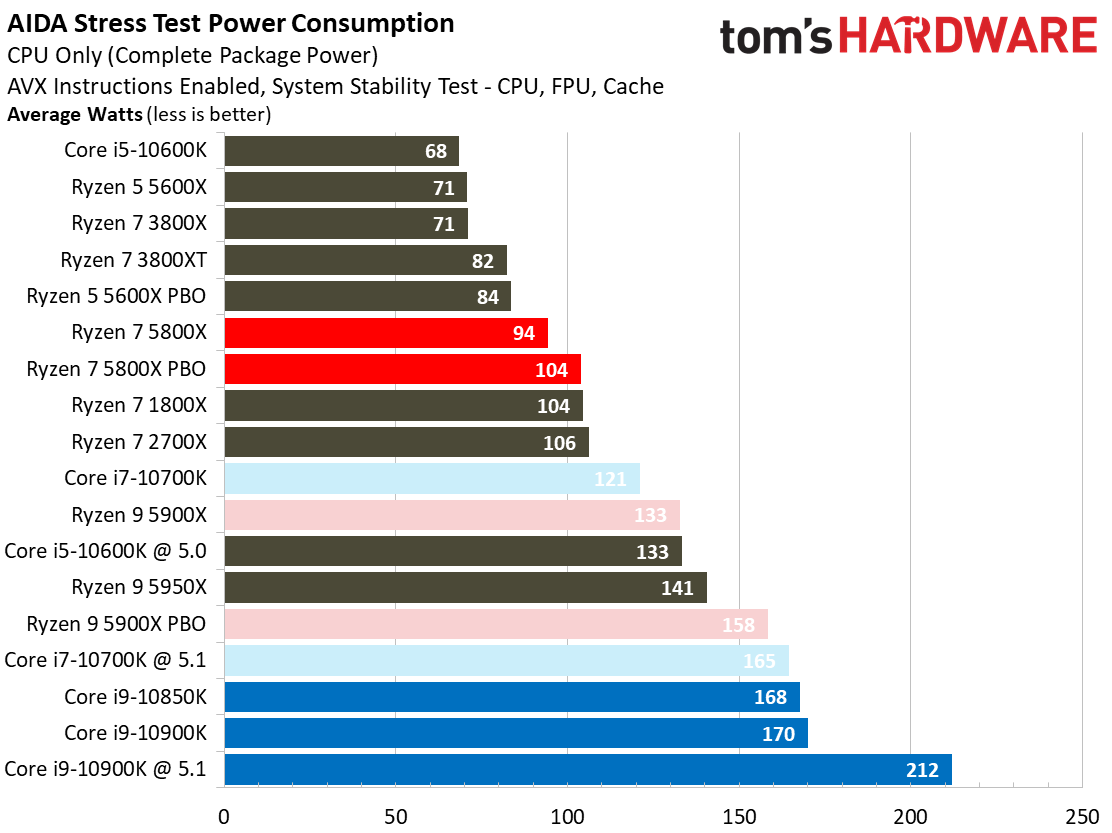
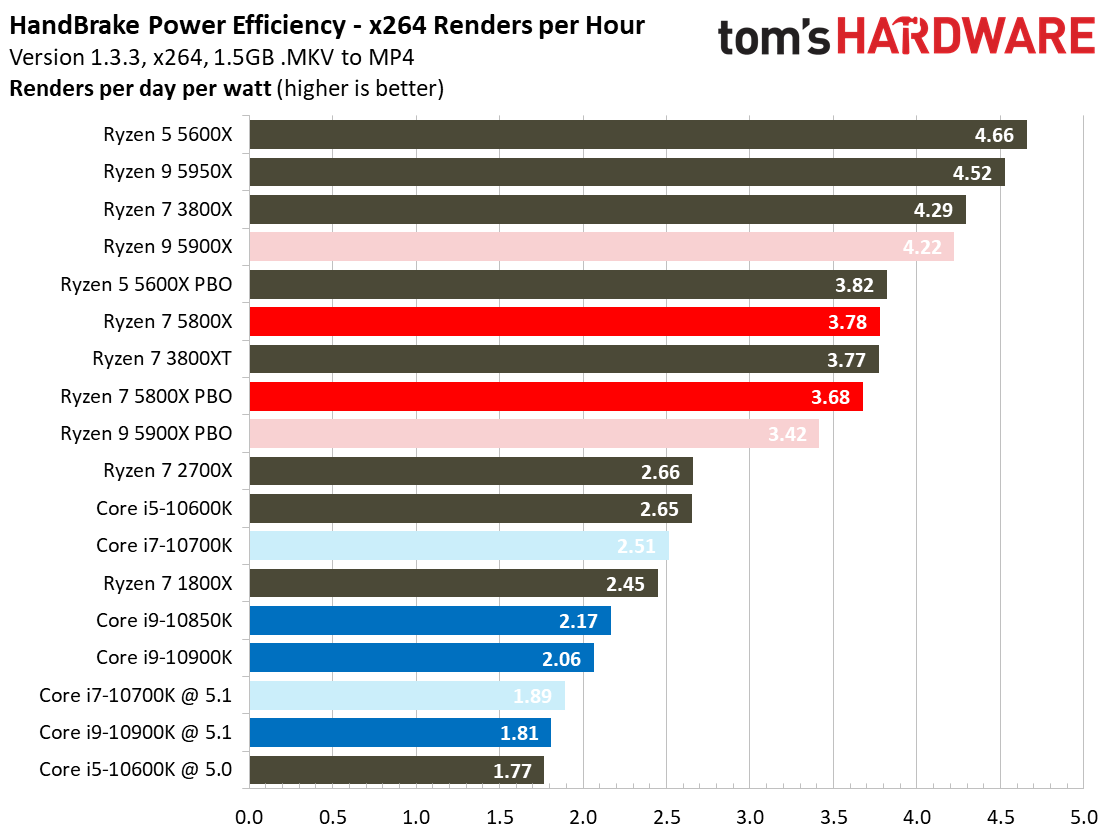
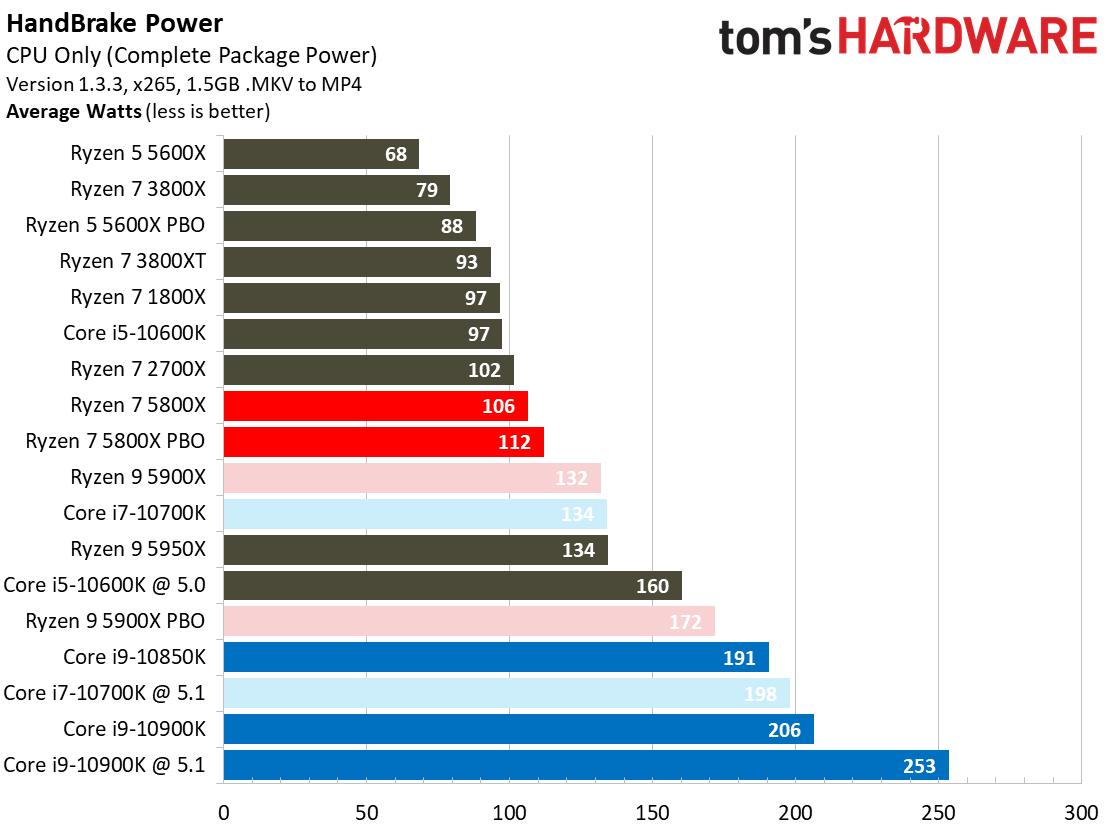
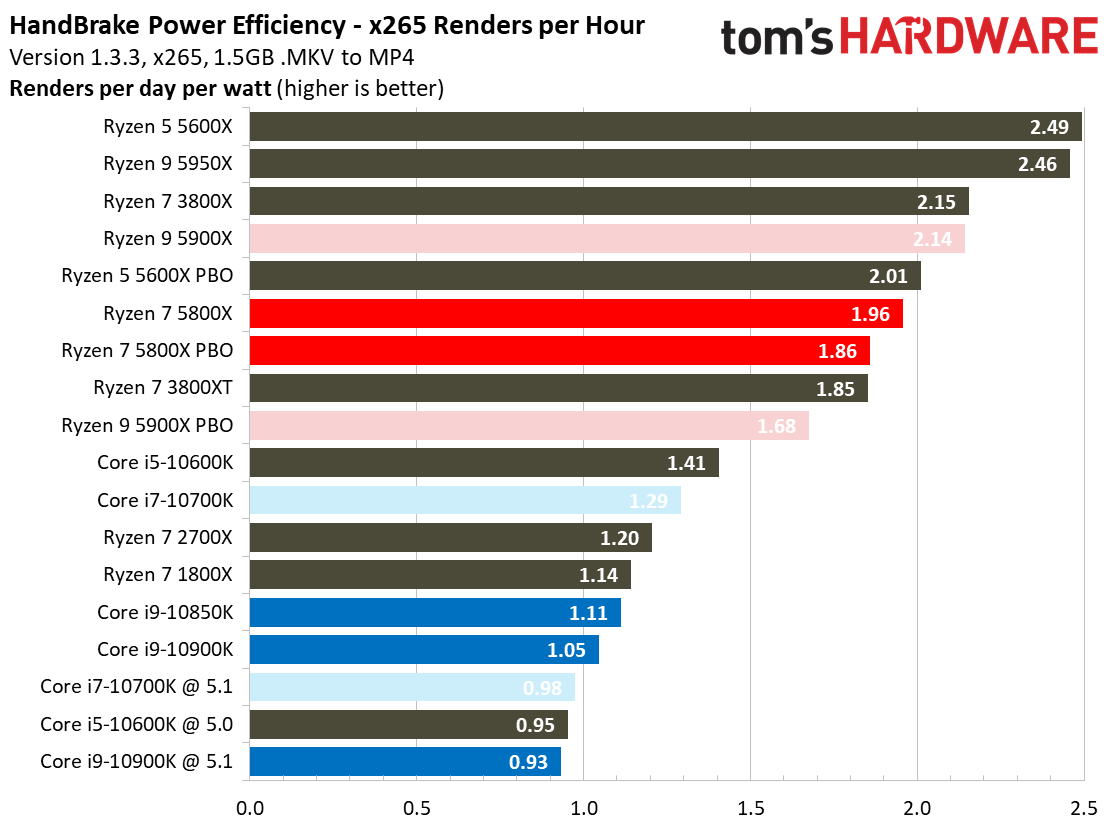
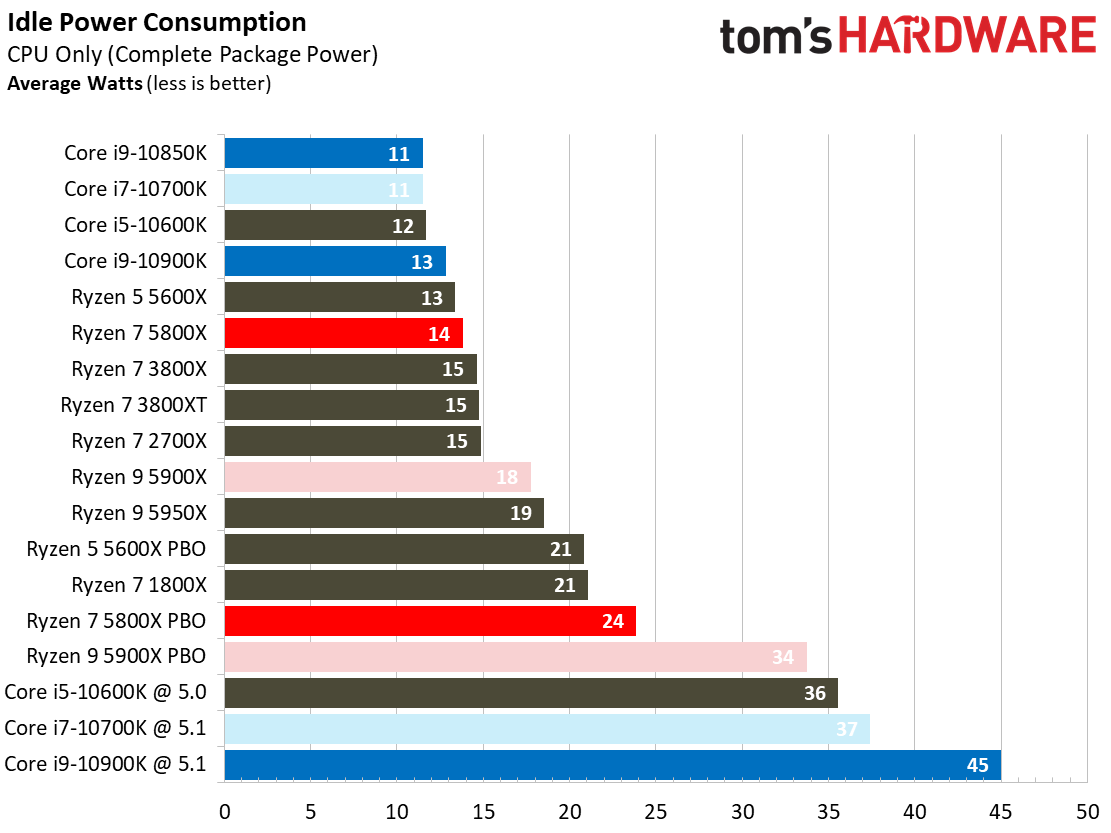
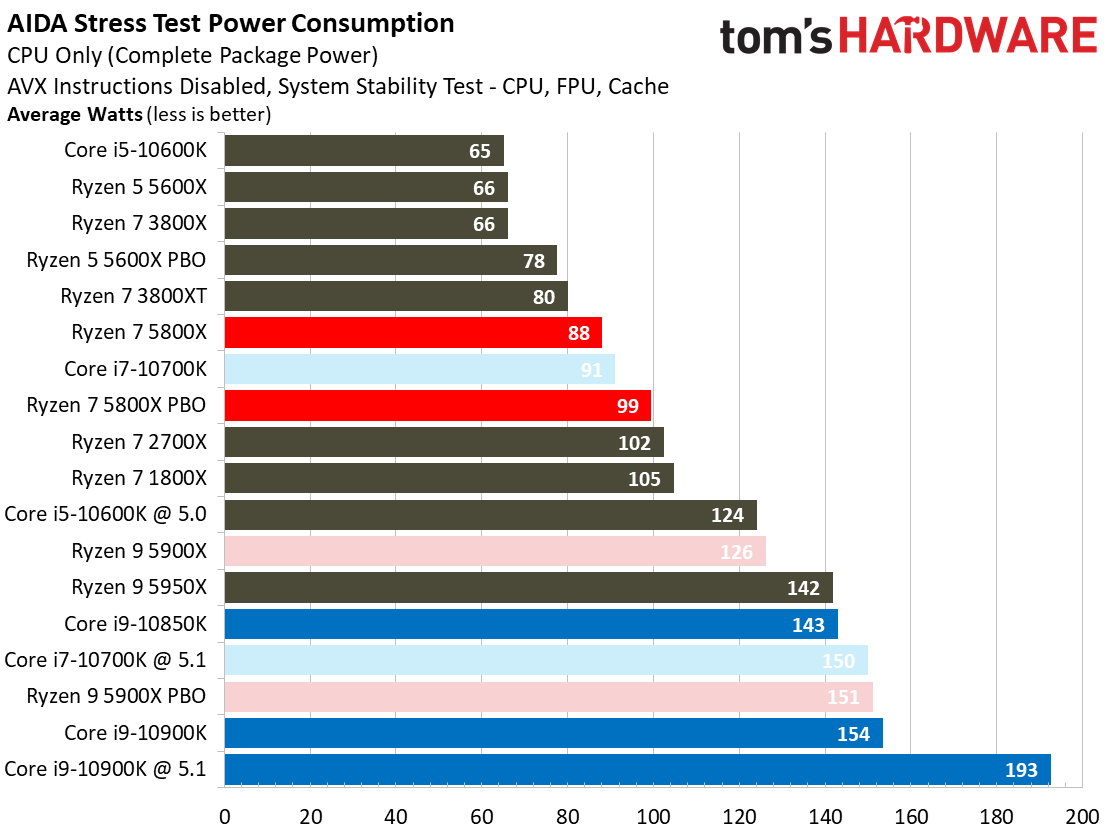
Notably, AMD's decision to stick with the AM4 socket still constrains its maximum power consumption to 142W, which means that it could not increase power consumption for the new flagship models. However, Zen 3's IPC gains allow the Ryzen 5000 chips to stay within the same TDP thermal and electrical ranges as the Ryzen 3000 series CPUs while delivering more performance.
As such, the 105W Ryzen 7 5800X must adhere to the same 142W PPT limit as its 105W predecessor. As you can see in the y-cruncher threaded benchmark results, the Ryzen 7 5800X consumes a peak of 112 watts at stock settings in this heavy AVX workload, which is much higher than the previous-gen Ryzen 7 3800XT. We also see more power consumption during the HandBrake and Blender runs, but the deltas aren't as pronounced in these heavily-threaded workloads.
The increased power consumption comes as a natural byproduct of AMD's revamped boosting algorithms that let the chip skirt the limits of its thermal envelope during stock operation, consuming more power to maximize performance potential.
Naturally, more effectively consuming that extra thermal headroom results in higher performance. In tandem with Zen 3's higher IPC, this typically exposes higher efficiency, but we did catch an exception to the rule. Our measurements indicate that the Ryzen 7 3800XT is just as efficient as the 5900X in our HandBrake x264 tests, but the 5800X is more efficient in other types of workloads, like the AVX-heavy HandBrake x265 benchmark. Interestingly, the Ryzen 7 3800X beats the 5800X in terms of efficiency, but it also operates at a much lower overall clock rate of ~4.1 GHz during the test, while the 5800X runs at ~4.5 GHz. As a result, the 3800X lands further down the voltage/frequency curve, granting it an efficiency advantage in these specific workloads, but that results in reduced performance. Conceptually, think of this as akin to the 3800X being a 3800XT running in AMD's Eco Mode. As always, there are tradeoffs associated with design goals, and here it seems that AMD's decision to push the performance envelope results in slightly lower efficiency in a few rare workloads.
Intel's chips are rather inefficient in comparison, which is a natural byproduct of using the older and less-dense 14nm node. Intel has also turned the dial up on the voltage/frequency curve to remain competitive, throwing efficiency out the window in exchange for higher performance.
The net-net is that the Ryzen 7 5800X, like other Zen 3 processors, will draw far less power per unit of work than any of Intel's 14nm chips, which results in a cooler and quieter system.
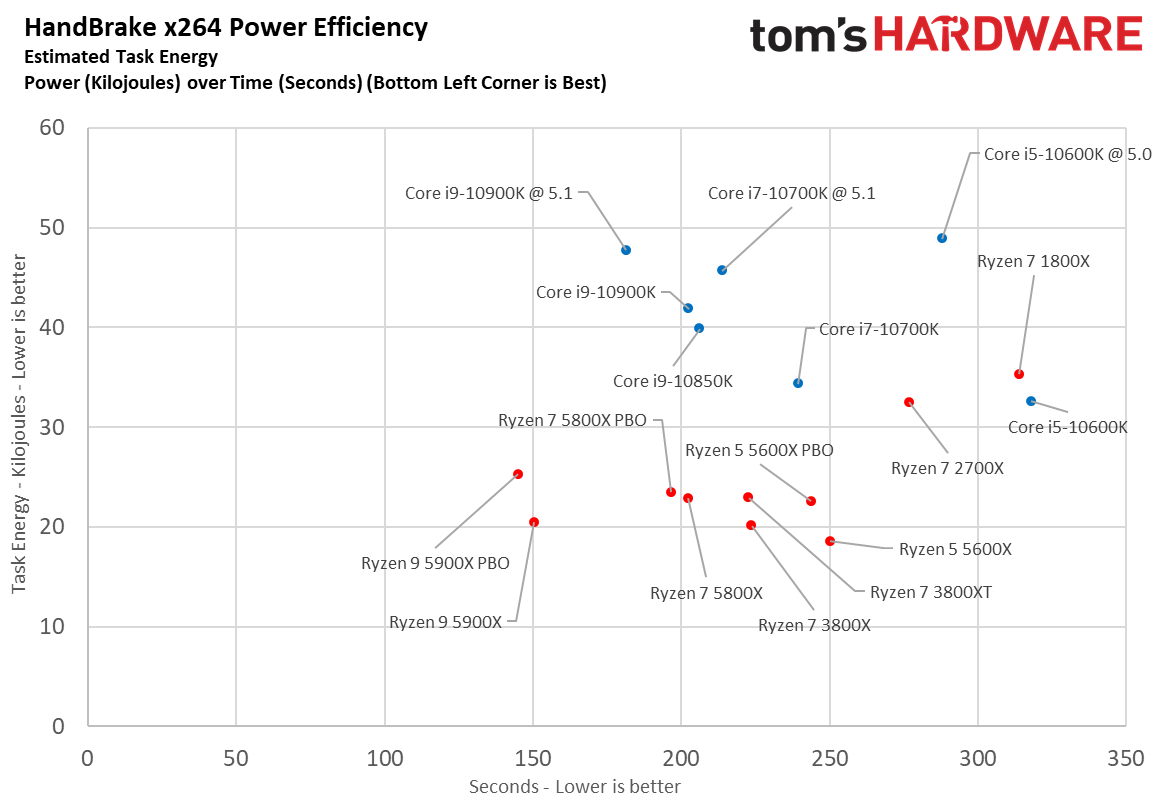
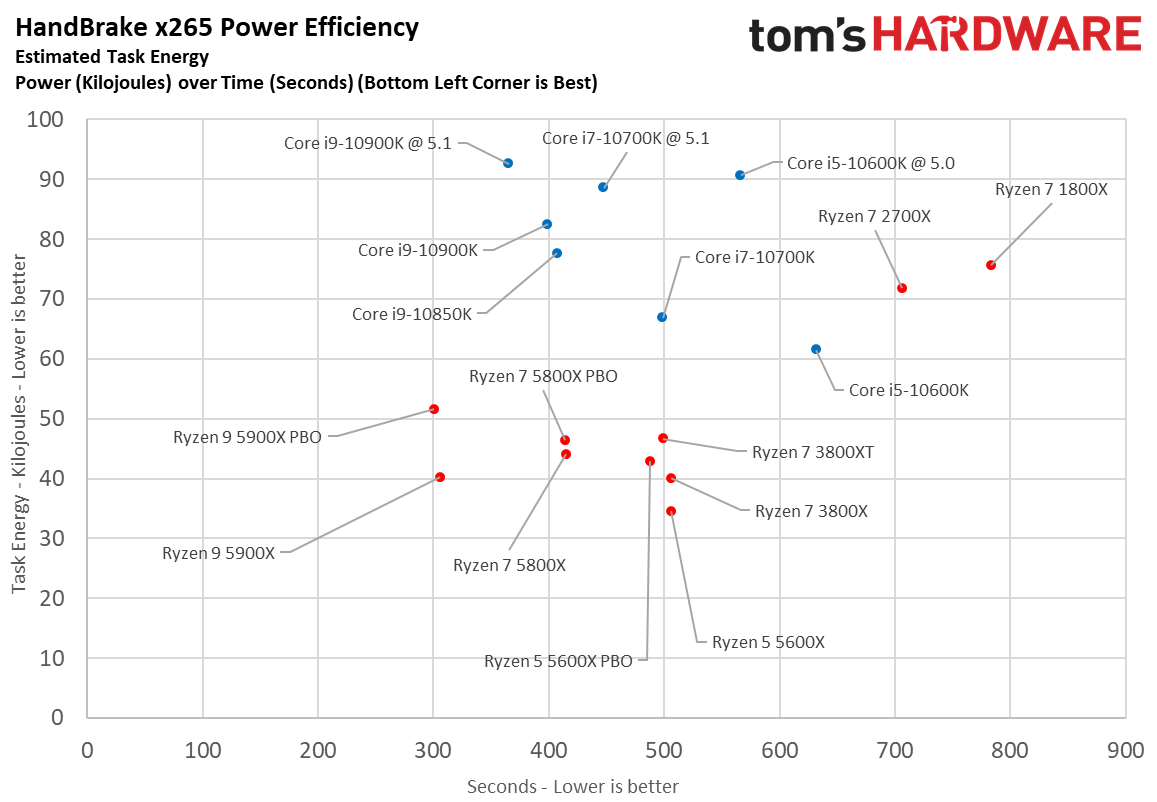
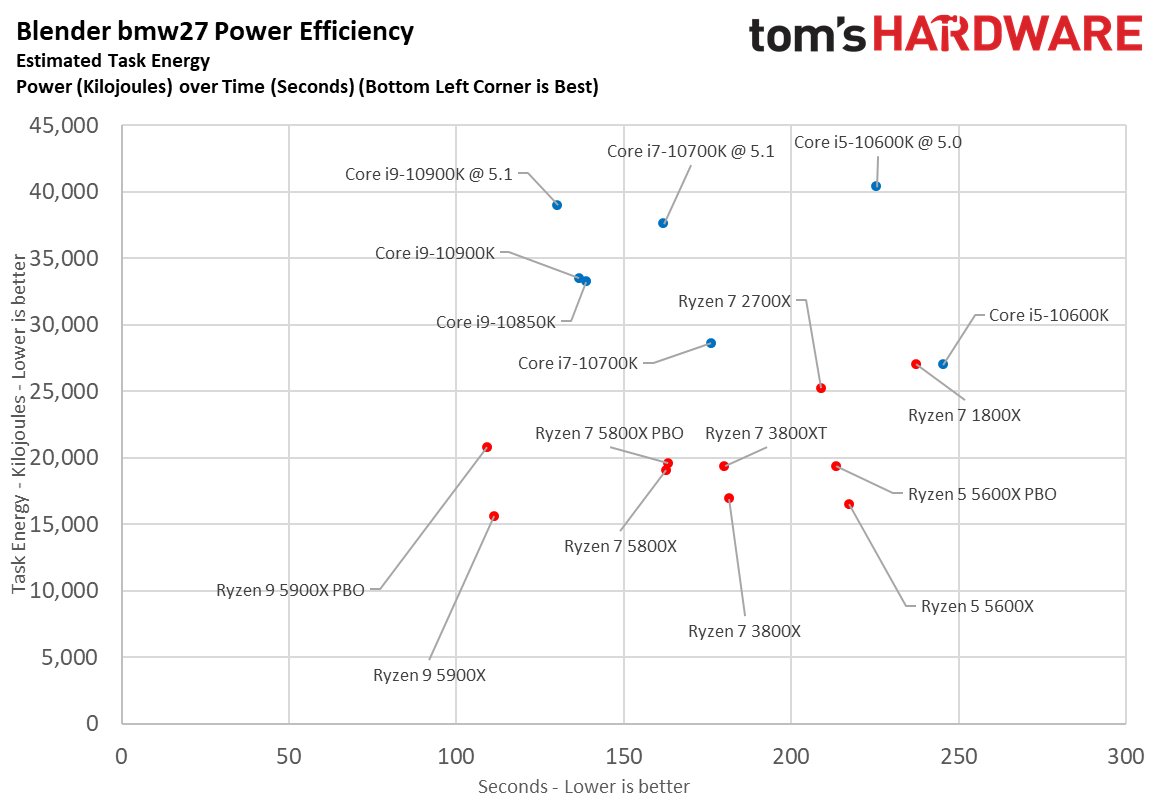
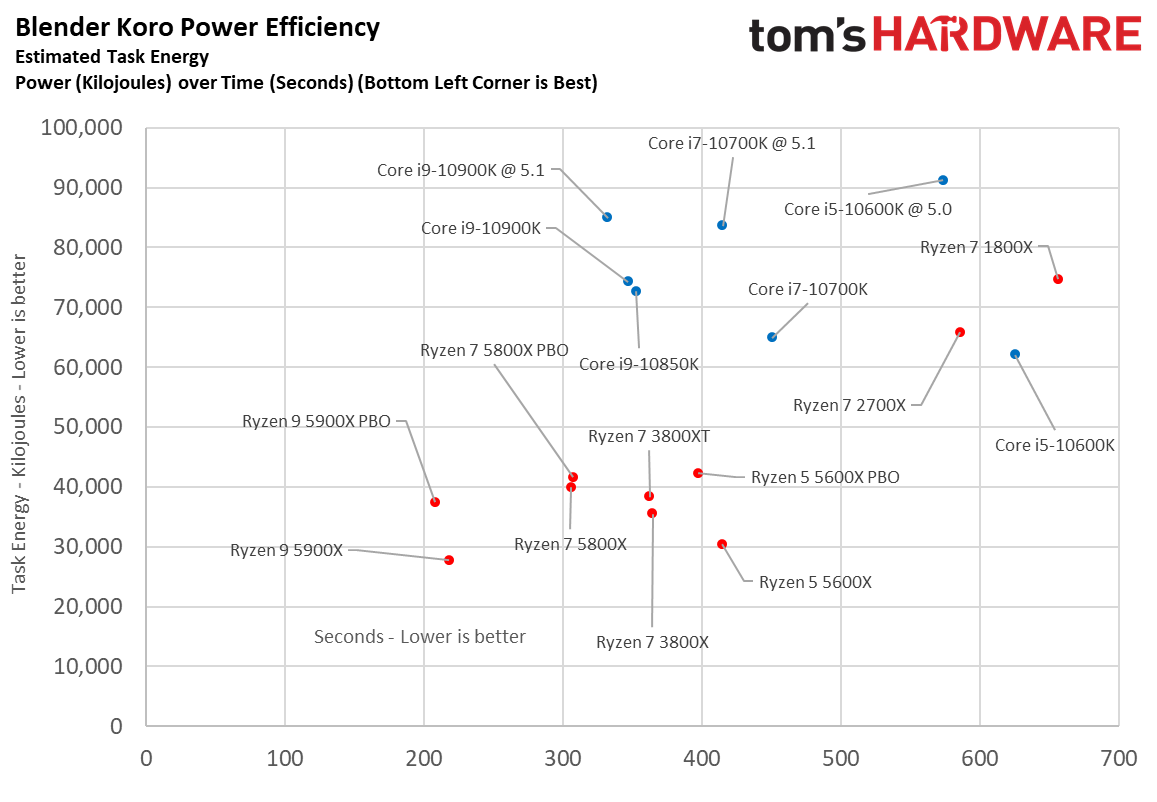
Here we take a slightly different look at power consumption by calculating the cumulative amount of energy required to perform x264 and x265 HandBrake workloads and two Blender renders. We plot this 'task energy' value in Kilojoules on the left side of the chart.
These workloads are comprised of a fixed amount of work, so we can plot the task energy against the time required to finish the job (bottom axis), thus generating a handy power chart. Bear in mind that faster compute times and lower task energy requirements are ideal.
Get Tom's Hardware's best news and in-depth reviews, straight to your inbox.
This measure really separates the wheat from the chaff, and the best results fall to the lower left-hand corner of the chart. You'll notice the modern Ryzen chips all populate the desirable bottom portion of the chart, while Intel's power-hungry chips climb to the top of the chart. Check out the Ryzen 7 1800X to see how far AMD has come in the efficiency department in a relatively short period of time.
MORE: Best CPUs
MORE: Intel and AMD CPU Benchmark Hierarchy Comparisons
MORE: All CPUs Content
Current page: Ryzen 7 5800X Power Consumption, Thermals
Prev Page AMD Ryzen 7 5800X Boost Frequency, Thermals, Overclocking, Test Setup Next Page Ryzen 7 5800X Gaming Performance
Paul Alcorn is the Editor-in-Chief for Tom's Hardware US. He also writes news and reviews on CPUs, storage, and enterprise hardware.
-
Co BIY "AMD's suggested selling prices rarely manifest at retail, and continuing shortages have found Ryzen 5000 chips selling far over recommended pricing. History indicates that, given sufficient supply, AMD's processors typically retail for far less than the official price points. That makes it hard to predict how pricing will shake out over the next months as supply normalizes. "Reply
Given current market conditions I would expect both AMD and Intel to be able to sell almost everything they make at the prices they want (plus some "obscene" profits for the retailers)
Intel has been able to sell everything they make for the last few years and made tons of money despite their 10nm problems and lack of enthusiast excitement for their incremental gains.
AMD is at parity or has a small lead in performance and can demand the same prices. They probably cannot easily increase production.
AMD's history of below MSRP prices is when they were second tier products in low demand. No reason to think that will be the case going forward on either the supply or the demand side. I don't think I would try waiting for an AMD 5800XT to drop below MSRP.
OTOH - Both AMD and Intel's mid-range chips should be the real competition for their high end products. Games are GPU bound and the mid-range offerings are more than adequate for even a high-end GPU if you can find one. This article clearly points to that sweet spot. -
Phobos258 The tests that put the 5800x PBO at the top of the list show why AMD feels like they can charge what they want for this chip.Reply
Price may suck but it's more available then the rest of the fleet right now. -
purple_dragon The only problem here is the fact you can't acquire a 5000 series chip easily. Whereas, Intel chips are readily available and the I7-10700k is the most reasonable cpu at the moment unless your lucky enough to stumble upon an in stock AMD cpu. Hopefully production catches up with demand soon but it probably won't until March or April 2021.Reply -
clsmithj I'm not in a market for a CPU, my ZEN+ & ZEN2 family CPUs are enough. But if one can get AMD and NVIDIA to kick-start production again of their graphics cards. That would be great.Reply -
Friesiansam "AGAINSTPriceReply
No bundled cooler
No integrated graphics" I don't think most buyers, at this level, are going to be bothered about points 2 and 3. I certainly wouldn't be. -
Remedailjoe Everyone who's commenting negatively obviously doesnt own this chip. My single scores are insane. Hands down destroys anything in intels line up. PBO uses voltage I dont like but it maybe my mobo. Gigabyte x570 Aorus Master.. Hits 1.5volts so i disabled it and set all core 4.85ghz at 1.375volt... Shattered-Dreams #8 CpuZ validation at 5.05ghz. On cell so no link. Over 690 single core.Reply
As for ram I can easily oc my ram 3600 gskill ripjaw 4x8gb to 4200 at 1.45v cl19. Ram oc is all in the motherboard.. And using realistic timings.. -
zodiacfml The 5800x is Amd's perfect silicon, only next to the 16 core. The price is justified being way ahead of its time unlike the 5600x which is perfext for current and existing gamesReply -
mikie tim t With AMD constrained from TSMC, they need to get as much money as they can with the wafers they get. They will have no shortage of I/O dies as they are 12nm from Global Foundries, so it makes absolute business sense to get as much money right now as they can with the inputs they have available, which means that 5800X is going to be what they push out the doors until they have enough lower quality chiplets to boost production of 5600X and 5900X, respectively. I was able to get a 5800X from the Overland Park, KS MicroCenter at MSRP, and it has been a night and day difference in responsiveness on everything over the 3600X it replaced, which wasn't particularly slothful. I don't feel shortchanged at all, quite frankly. I hope AMD can pull as much market share as possible from Intel these next few quarters, because that's what it will take to move both companies to better execution, to the benefit of us all.Reply -
mrv_co I get the argument on paper that the 5800x is overpriced, but that argument has been strictly an intellectual one to date. I also don't doubt that once supply finally outpaces demand, the street price will adjust accordingly. Regardless, bring on the 5700x for my SFF upgrade!Reply